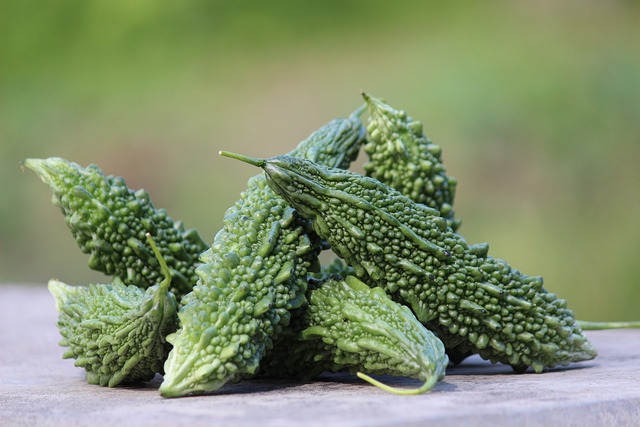The bumpy green fruit known as bitter melon, or Momordica charantia, is also called bitter gourd, karela, or balsam pear. It’s a low-calorie, low-carb fruit that contains plenty of beneficial fiber. If you’re curious about the health claims associated with bitter melon in traditional medicine, you might be wondering if there’s any scientific evidence to back them up. This article discusses the latest research on bitter melon.
Bitter Melon Nutrition Facts
The nutrient content of bitter melon differs slightly depending on whether it is consumed raw or cooked, as well as the part of the plant that is being eaten. According to the USDA, a serving size of 1 cup (124 grams) of cooked bitter melon without added fat contains the following nutritional information.
- Calories: 24
- Fat: 0.2g
- Sodium: 392mg
- Carbohydrates: 5.4g
- Fiber: 2.5g
- Sugar: 2.4g
- Protein: 1g
- Potassium: 395.6mg
- Magnesium: 19.8mg
- Vitamin C: 40.9mg
- Folate: 63.2mcg
Carbs
The majority of the calories in bitter melon are derived from carbohydrates. However, since the overall calorie count is minimal, the amount of carbs in bitter melon is also low. A serving of cooked bitter melon supplies a little over 5 grams of carbohydrates, 50 percent of which is fiber (2.5 grams). In addition, bitter melon has some natural sugars, but it is considered a low glycemic fruit.
Fats
Bitter melon has a low fat content as a cooked cup of it has less than 1/2 gram of fat, unless extra fat is incorporated while cooking.
Protein is an essential nutrient that plays a significant role in the body’s growth, maintenance and repair of tissues, and overall health and well-being.
Similar to many other fruits, bitter melon does not contain a considerable amount of protein.
Vitamins and Minerals
Bitter melon contains various micronutrients, such as vitamin A, vitamin C, calcium, potassium, phosphorus, zinc, copper, iron, and magnesium. Additionally, bitter melon offers several B-vitamins, along with beneficial antioxidants like lutein and zeaxanthin.
Health Benefits
Bitter melon’s association with diabetes treatment is frequently brought up, however, the outcomes of studies conducted for this intention vary greatly. Presently, here is the available data on the potential influence of bitter melon on enhancing health.
Reduces Abdominal Obesity
Most of the studies conducted on bitter melon’s effectiveness in reducing visceral fat storage have been on lab rats instead of humans, but there are encouraging findings.
Taking bitter melon supplements has been proven to inhibit the growth of fat cells by suppressing genes accountable for producing fresh adipose cells. Moreover, early human trials have reported a decrease in waist circumference when consuming bitter melon.
Enhances Immunity
Momordica anti-human immunodeficiency virus protein (MAP30) is a protein found in bitter melon that has the ability to enhance various immune system processes. Through its ability to hinder the HIV infection of T cells, increase the quantity of natural killer cells and T helper cells, and amplify B cell production of immunoglobulins, bitter melon seems to promote strong immunity.
Promotes Heart Health
Although research on humans is limited, bitter melon exhibits potential in the field of cardiovascular health. Research has revealed that bitter melon extract can effectively lower cholesterol levels by encouraging the excretion of cholesterol through bile acids.
In addition, the notion that the consumption of fruits and vegetables boosts heart health due to their fiber, potassium, and antioxidant vitamin content has been widely acknowledged. Incorporating more diverse and ample amounts of these foods into your eating pattern, such as bitter melon, is a way to encourage a lifestyle that is beneficial for the heart.
Prevents Cellular Damage
Various antioxidant compounds found in bitter melon have been shown to be successful in combating free radicals.
Several investigations have revealed that bitter melon’s leaves and fruit are advantageous phenols that can lower detrimental oxidants. Despite the lack of proof to confirm disease prevention and treatment, it implies the necessity of exploring other domains such as cancer prevention and aging.
Promotes Good Gut Health
Consuming bitter gourd regularly can have a beneficial effect on the health of the gut. This vegetable is effective in treating intestinal disorders such as constipation and stomach pain. Furthermore, it is also advantageous for those suffering from Irritable Bowel Syndrome (IBS) because it aids in eliminating parasites that invade the digestive system.
Furthermore, bitter gourd includes antioxidants that stimulate digestive enzymes and aid digestion. As a result of its natural laxative attribute and rich fiber content, medical professionals suggest bitter gourd as a means of sustaining optimal digestive wellness.
Bitter gourd affects the composition of microorganisms in the gut, as revealed by a microbiological investigation.
Helps Manage Diabetes
Bitter gourd is often recommended by medical professionals and nutrition experts to those suffering from diabetes due to its significant health advantages. This is largely due to the presence of three active substances (polypeptide-p, vicine, and Charanti) that possess anti-diabetic properties, which can help regulate blood glucose levels and mimic insulin.
Either alone or in combination, these compounds aid in the reduction of blood sugar levels. Additionally, bitter gourd contains a lectin that curbs the appetite and acts on the peripheral tissues, which results in the decrease of blood glucose concentrations.
Experts believe that lectin is the cause of the hypoglycemic effect, resulting in a decrease in blood sugar levels. Both the flesh and seeds of bitter gourd possess this beneficial property. Regular intake of bitter gourd juice on an empty stomach every morning can aid in managing diabetes effectively.
Keep in mind that it has an amazing effect on individuals who suffer from type 2 diabetes. This occurs when the pancreas fails to generate adequate amounts of insulin for absorption into the bloodstream. If you have type 1 diabetes, it’s important to seek advice from your physician prior to intake.
Purifies Blood and Cleanses Liver
Bitter gourd’s antimicrobial and antioxidant characteristics aid in the elimination of toxins. Studies indicate that it can effectively eliminate all forms of liver intoxication. This demonstrates bitter gourd’s ability to treat various liver ailments while also purging the colon. It also promotes healthy bladder function.
Experts suggest that drinking bitter gourd juice when experiencing a hangover can alleviate alcohol intoxication, resulting in heightened energy levels.
Protects against Cancer
The fundamental reason behind cancer is free radicals, which have an impact on the functioning of our body. Hence, it is crucial to have a free radical-free body. Free radicals are produced during metabolism and their production escalates through smoking, pollution, and stress.
Lycopene, lignans, carotenoids, vitamin A, zeaxanthin, and lutein are present in bitter gourd along with essential antioxidants and nutrients, which effectively combat free radicals and consequently minimize the development of tumors within the body.
A study has revealed that bitter melon possesses properties that can prevent the development of prostate, breast and cervical cancers, serving as an anti-carcinogen and anti-tumor agent.
Regulates Cholesterol
High cholesterol levels may result in fatty plaque buildup in the arteries. It makes your heart work harder to pump blood. As a result, the risk of cardiovascular diseases increases.
Numerous studies indicate that bitter gourd can help in lowering levels of “bad” cholesterol and regulating levels of “good” cholesterol, which promotes good overall health. Moreover, bitter gourd is a rich source of heart-beneficial nutrients such as potassium, magnesium, and calcium.
Adds Luster and Shine to Hair
Hair growth is promoted and hair health is supported by bitter gourd due to its protein, zinc, and vitamin C components, which contribute to the maintenance of strong and healthy hair.
The application of bitter gourd juice on your hair provides various benefits such as maintaining its shine and gloss, strengthening the hair roots, preventing hair fall and split ends. Furthermore, it can also treat troublesome hair conditions like hair greying, dryness, dandruff, and scalp itchiness.
Beautifies the Skin
Bitter gourd is rich in vitamin C, which is essential for maintaining wrinkle-free skin and preventing premature aging.
Additionally, it contains additional nutrients that assist in the production of collagen, which is responsible for the smoothness and elasticity of our skin. Moreover, it diminishes skin imperfections and acne, and is helpful in the treatment of psoriasis and eczema. Furthermore, it safeguards our skin from the detrimental effects of the sun’s ultraviolet rays.
According to research, bitter melon is crucial in the treatment of photo-oxidative damage, skin wrinkling, and melanogenesis, which is responsible for the production of melanin. Melanin is the pigment that determines the color of your hair.
Keeps the Eyes Healthy
According to physicians and medical professionals, bitter gourd is beneficial in avoiding eye-related issues like weak eyesight and cataracts due to its high content of vitamin A and beta-carotene, which promote eye health. Furthermore, it is also an effective solution for reducing dark circles.
Heals Wounds
Healing wounds is one of the well-known attributes of bitter melon as it enhances the generation of growth factors in the wounded area. Moreover, the induction of proliferation has a crucial part in the process of wound healing.
By boosting capillary circulation, bitter melon enhances the oxygen supply to wounds. Its antimicrobial and antioxidant properties work to enable the wounds to contract and close, while also expediting the epithelialisation process that covers the denuded surface and reduces tension induced by the injury.
Energizes the Body
Incorporating bitter gourd into your regular diet can enhance the body’s endurance and vitality, as well as enhance the quality of sleep and alleviate sleep issues like insomnia.
Clears Kidney Stones Naturally
Passing kidney stones is a highly painful experience, owing to their solid structure consisting of either calcium phosphate or calcium oxalate. One way to facilitate the natural breakdown of these stones is to add bitter gourd to one’s diet, which not only helps in preventing their formation by curbing the production of high acidic content but also improves cardiac health.
Allergies
Although not widely recognized as an allergen, bitter melon may still trigger hypersensitivity. If you experience any symptoms upon consumption or handling of this fruit, it is imperative to seek a medical evaluation from your doctor.
Adverse Effects
Pregnant women are advised by health experts to stay away from bitter melon as it can lead to early contractions and the chances of a miscarriage.
If you are consuming P-glycoprotein substrates or Cytochrome P450 substrates, bitter melon could potentially cause problems for you. Bitter melon has the potential to increase the potency of diabetes drugs, meaning that combining it with other medications meant to lower glucose levels or insulin could be risky.
Bitter melon use has been linked to diarrhea, vomiting, and headaches. It is advisable to gradually increase your intake and monitor your body’s reaction to this unfamiliar food.
Vaginal Bleeding, Contractions, and Miscarriage
As per research, pregnant women are advised to avoid eating bitter gourd in the first few months of pregnancy. This is because it can stimulate contractions, resulting in vaginal bleeding that potentially leads to a miscarriage. Additionally, bitter gourd may bring on premature labor. For those who are already at risk of anemia, the seeds of bitter gourd can cause favism when consumed during pregnancy.
Lowering of blood sugar if taken with insulin
As bitter melon functions similar to insulin, its consumption with glucose-lowering medication can cause a severe drop in blood sugar levels. Therefore, individuals with diabetes must exercise caution while consuming bitter gourd. In severe cases, this may result in a hypoglycemic coma, which occurs due to an overly high or excessively low insulin dosage, leading to a comatose state.
If you are about to have surgery or have recently had surgery, it is recommended that you steer clear of bitter gourd because it may cause an imbalance in your body’s glucose levels.
Varieties
Bitter melon comes in two different types: Indian and Chinese. Chinese bitter melon is less bitter, has smoother ridges and fewer warts than Indian bitter melon. It can be consumed as a fruit or juiced. Additionally, supplements or teas made from bitter melon extract or powdered seeds are also available for purchase.
When It’s Best
It is unlikely that bitter melon can be purchased at most chain grocery stores, but it can be found year-round in several Asian markets. Alternatively, you may come across it at your nearby farmer’s market during late summer or early autumn.
There are various hues of bitter melon that correspond to different types. Typically, purchasing a green bitter melon indicates that it has yet to fully ripen. Nonetheless, numerous chefs make use of unripe bitter melon in their dishes.
While bitter melon is classified as a fruit, it can be prepared like a vegetable for certain recipes. If you’re unfamiliar with bitter melon, you can explore cultural recipes or consult with farmers who cultivate it for unique ideas on its utilization.
Storage and Food Safety
Bitter melon should be refrigerated until it is ready to be used, as it has a tendency to spoil quickly. Before slicing it, make sure to thoroughly wash it under running water and wipe it dry with a paper towel to eliminate any dirt or germs. After cutting, store the bitter melon in the refrigerator like any other fruit for up to 3-5 days. If there are any indications of sliminess, mold, or deterioration, discard it.
How to Prepare
Before cooking bitter melon, it is necessary to strip off the waxy outer layer using a peeler or paring knife. Various methods can be used to prepare bitter melon, such as boiling, steaming, or incorporating it into a stir-fry. Another technique involves scooping out the melon’s interior and filling it with pork sausage or chilies.
If you find the bitter taste unpleasant, you can develop a liking for it over time. To make it more palatable, immerse the fruit in salted water for 30 to 45 minutes before using it in your cooking.



